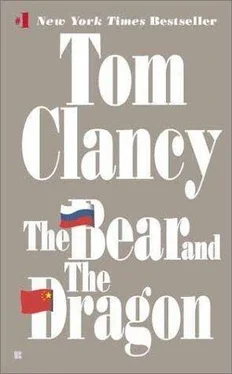Tom Clancy - The Bear and the Dragon
Здесь есть возможность читать онлайн «Tom Clancy - The Bear and the Dragon» весь текст электронной книги совершенно бесплатно (целиком полную версию без сокращений). В некоторых случаях можно слушать аудио, скачать через торрент в формате fb2 и присутствует краткое содержание. Год выпуска: 2001, ISBN: 2001, Жанр: Триллер, на английском языке. Описание произведения, (предисловие) а так же отзывы посетителей доступны на портале библиотеки ЛибКат.
- Название:The Bear and the Dragon
- Автор:
- Жанр:
- Год:2001
- ISBN:780425180969
- Рейтинг книги:3 / 5. Голосов: 1
-
Избранное:Добавить в избранное
- Отзывы:
-
Ваша оценка:
- 60
- 1
- 2
- 3
- 4
- 5
The Bear and the Dragon: краткое содержание, описание и аннотация
Предлагаем к чтению аннотацию, описание, краткое содержание или предисловие (зависит от того, что написал сам автор книги «The Bear and the Dragon»). Если вы не нашли необходимую информацию о книге — напишите в комментариях, мы постараемся отыскать её.
The Bear and the Dragon — читать онлайн бесплатно полную книгу (весь текст) целиком
Ниже представлен текст книги, разбитый по страницам. Система сохранения места последней прочитанной страницы, позволяет с удобством читать онлайн бесплатно книгу «The Bear and the Dragon», без необходимости каждый раз заново искать на чём Вы остановились. Поставьте закладку, и сможете в любой момент перейти на страницу, на которой закончили чтение.
Интервал:
Закладка:
That made good sense, Diggs thought. “How many?”
“Six, plus you.”
“Okay.” The general nodded and reached for the captain who’d summoned him from his seat. “I want Colonels Masterman, Douglas, Welch, Turner, Major Hurst, and Lieutenant Colonel Garvey.”
“Yes, sir.” The boy disappeared.
“How soon?”
“The transport is waiting for you now.”
One of theirs, Diggs thought. He’d never flown on a Russian aircraft before. How safe would it be? How safe would it be to fly into a war zone? Well, the Army didn’t pay him to stay in safe places.
“Who are you?”
“Nosenko, Valentin Nosenko, general major, Stavka.”
“How bad is it?”
“It is not good, General Diggs. Our main problem will be getting reinforcements to the theater of action. But they have rivers to cross. The difficulties, as you Americans say, should even out.”
Diggs’s main worry was supply. His tanks and Bradleys all had basic ammo loads already aboard, and two and a half additional such loads for each vehicle were on supply trucks sitting on other trains like this one. After that, things got a little worrisome, especially for artillery. But the biggest worry of all was diesel fuel. He had enough to move his division maybe three or four hundred miles. That was a good long way in a straight line, but wars never allowed troops to travel in straight lines. That translated to maybe two hundred miles of actual travel at best, and that was not an impressive number at all. Then there was the question of jet fuel for his organic aircraft. So, his head logistician, Colonel Ted Douglas, was the first guy he needed, after Masterman, his operations brain. The officers started showing up.
“What gives, sir?” Masterman asked.
“We’re flying east to see what’s going on.”
“Okay, let me make sure we have some communications gear.” Masterman disappeared again. He left the train car, along with two enlisted men humping satellite radio equipment.
“Good call, Duke,” LTC Garvey observed. He was communications and electronic intelligence for First Tanks.
“Gentlemen, this is General Nosenko from Stavka. He’s taking us east, I gather?”
“Correct, I am an intelligence officer for Stavka. This way, please.” He led them off, to where four cars were waiting. The drive to a military airport took twenty minutes.
“How are your people taking this?” Diggs asked.
“The civilians, you mean? Too soon to tell. Much disbelief, but some anger. Anger is good,” Nosenko said. “Anger gives courage and determination.”
If the Russians were talking about anger and determination, the situation must be pretty bad, Diggs thought, looking out at the streets of the Moscow suburbs.
“What are you moving east ahead of us?”
“So far, four motor-rifle divisions,” Nosenko answered. “Those are our best-prepared formations. We are assembling other forces.”
“I’ve been out of touch. What else is NATO sending? Anything?” Diggs asked next.
“A British brigade is forming up now, the men based at Hohne. We hope to have them on the way here in two days.”
“No way we’d go into action without at least the Brits to back us up,” Diggs said. “Good, they’re equipped about the same way we are.” And better yet, they trained according to the same doctrine. Hohne, he thought, their 22nd Brigade from Haig Barracks, Brigadier Sam Turner. Drank whiskey like it was Perrier, but a good thinker and a superior tactician. And his brigade was all trained up from some fun and games down at Grafenwöhr. “What about Germans?”
“That’s a political question,” Nosenko admitted.
“Tell your politicians that Hitler’s dead, Valentin. The Germans are pretty good to have on your side. Trust me, buddy. We play with them all the time. They’re down a little from ten years ago, but the German soldier ain’t no dummy, and neither are his officers. Their reconnaissance units are particularly good.”
“Yes, but that is a political question,” Nosenko repeated. And that, Diggs knew, was that, at least for now.
The aircraft waiting was an II-86, known to NATO as the Camber, manifestly the Russian copy of Lockheed’s C-141 Starlifter. This one had Aeroflot commercial markings, but retained the gun position in the tail that the Russians liked to keep on all their tactical aircraft. Diggs didn’t object to it at the moment. They’d scarcely had the chance to sit down and strap in when the aircraft started rolling.
“In a hurry, Valentin?”
“Why wait, General Diggs? There’s a war on,” he reminded his guest.
“Okay, what do we know?”
Nosenko opened the map case he’d been carrying and laid out a large sheet on the floor as the aircraft lifted off. It was of the Chinese-Russian border on the Amur River, with markings already penciled on. The American officers all leaned over to look.
“They came in here, and drove across the river …”
How fast are they moving?” Bondarenko asked.
“I have a reconnaissance company ahead of them. They report in every fifteen minutes,” Colonel Tolkunov replied. “They are moving in a deliberate manner. Their reconnaissance screen is composed of WZ-501 tracked APCs, heavy on radios, light on weapons. They are on the whole not very enterprising, however. As I said, deliberate. They move by leapfrogging half a kilometer at a bound, depending on terrain. We’re monitoring their radios. They’re not encrypted, though their spoken language is deceptive in terminology. We’re working on that.”
“Speed of advance?”
“Five kilometers in an hour is the fastest we’ve seen, usually slower than that. Their main body is still getting organized, and they haven’t set up a logistics train yet. I’d expect them to attempt no more than thirty kilometers in a day on flat open ground, based on what I’ve seen so far.”
“Interesting.” Bondarenko looked back at his maps. They’d start going north-northwest because that’s what the terrain compelled them to do. At this speed, they’d be at the gold strike in six or seven days.
Theoretically, he could move 265th Motor Rifle to a blocking position … here … in two days and make a stand, but by then they’d have at least three, maybe eight, mechanized divisions to attack his one full-strength unit, and he couldn’t gamble on that so soon. The good news was that the Chinese were bypassing his command post- contemptuously? he wondered, or just because there was nothing there to threaten them, and so nothing to squander force
on? No, they’d run as fast and hard as they could, bringing up foot infantry to wall off their line of advance. That was classic tactics, and the reason was because it worked. Everyone did it that way, from Hannibal to Hitler.
So, their lead elements moved deliberately, and they were still forming up their army over the Amur bridgehead.
“What units have we identified?”
“The lead enemy formation is their 34th Red Banner Shock Army, Commanded by Peng Xi-Wang. He is politically reliable and well-regarded in Beijing, an experienced soldier. Expect him to be the operational army group commander. The 34th Army is mainly across the river now. Three more Group A mechanized armies are lined up to cross as well, the 31st, 29th, and 43rd. That’s a total of sixteen mechanized divisions, plus a lot of other attachments. We think the 65th Group B Army will be next across. Four infantry divisions plus a tank brigade. Their job will be to hold the western flank, I would imagine.” That made sense. There was no Russian force east of the breakthrough worthy of the name. A classic operation would also wheel east to Vladivostok on the Pacific Coast, but that would only distract forces from the main objective. So, the turn east would wait for at least a week, probably two or three, with just light screening forces heading that way for the moment.
Читать дальшеИнтервал:
Закладка:
Похожие книги на «The Bear and the Dragon»
Представляем Вашему вниманию похожие книги на «The Bear and the Dragon» списком для выбора. Мы отобрали схожую по названию и смыслу литературу в надежде предоставить читателям больше вариантов отыскать новые, интересные, ещё непрочитанные произведения.
Обсуждение, отзывы о книге «The Bear and the Dragon» и просто собственные мнения читателей. Оставьте ваши комментарии, напишите, что Вы думаете о произведении, его смысле или главных героях. Укажите что конкретно понравилось, а что нет, и почему Вы так считаете.






![Александр Ирвин - Tom Clancy’s The Division 2. Фальшивый рассвет [litres]](/books/417744/aleksandr-irvin-tom-clancy-s-the-division-2-falsh-thumb.webp)




